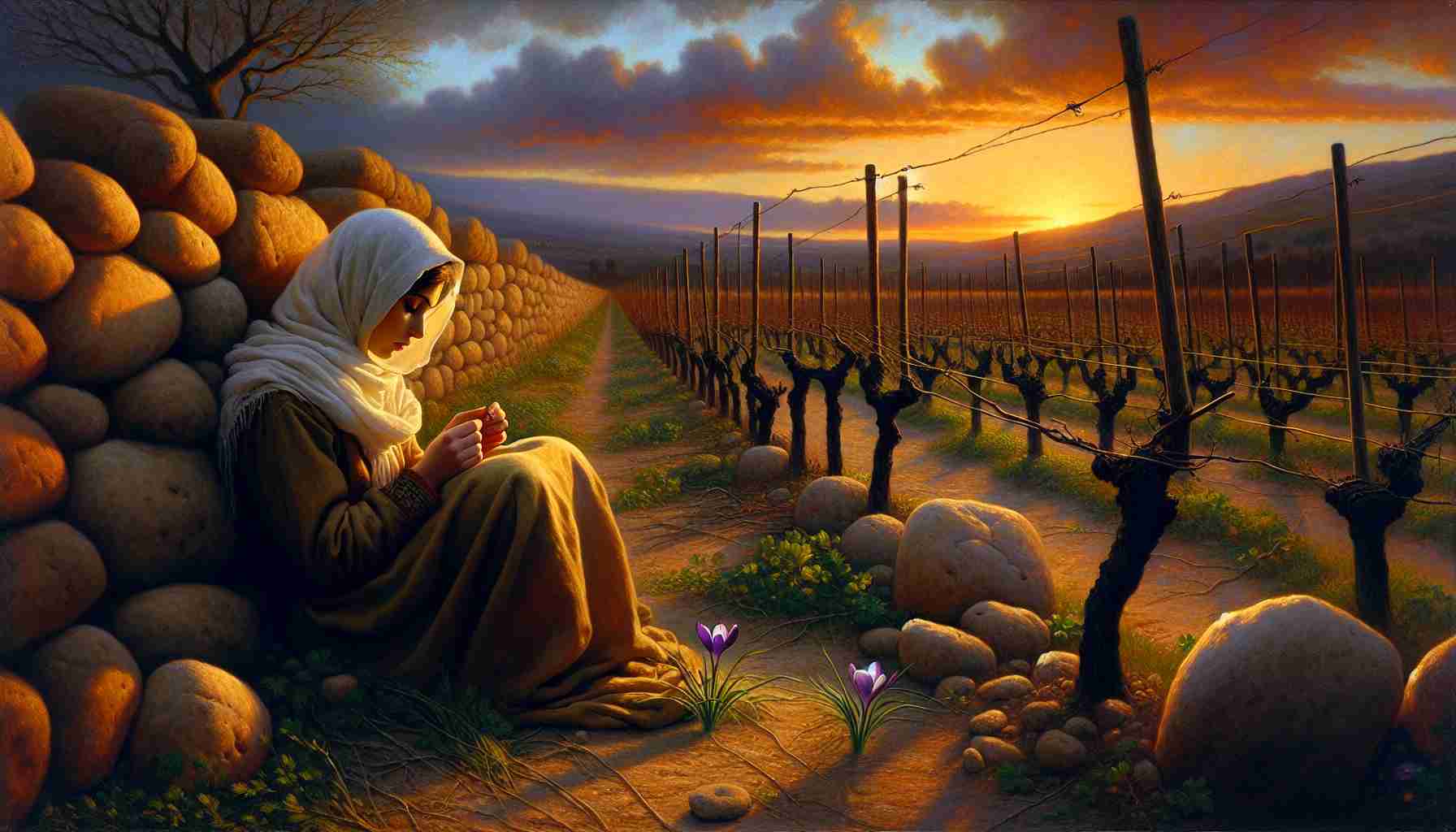

The sunset bled gold and crimson over the hills, yet Miriam sat unmoving by the crumbling stone wall at the edge of the vineyard. Her fingers twisted a dry blade of grass as tears prickled against stubbornly lowered lashes. She hated feeling like this—impatient, restless, tired of waiting. Everyone around her seemed to be stepping into the flow of life: engagements announced, babies born, new homes built. And here she was, still in the same small house, in the same village, still praying for something—what, exactly, even she wasn’t sure anymore.
She tipped her head back against the stones and closed her eyes, trying not to hear the quiet mockery of her own heart. "You’re stuck," it hissed. "You won't move forward because G-d forgot about you."
The wind stirred, carrying with it the dusty sweet scent of the grapevines that had just begun to bud. Miriam forced her eyes open—and saw, to her surprise, a tiny violet crocus pushing up between two stones by her feet. It was impossibly delicate, its petals trembling in the breeze, yet somehow it had found a way in the hard, rocky earth.
She bent closer, marveling. How had it survived, let alone bloomed?
A memory surfaced unbidden: her grandfather’s voice, rough with age but sure, telling her as a little girl, “To everything there is a season, motek. You cannot rush the spring, even if the winter feels endless.”
Tears welled again, but this time they flowed freely, washing away something tight and aching inside her. Miriam sank down fully onto the warm stones, burying her face in her hands.
"I don't understand Your timing, HaShem," she whispered aloud. "But maybe... I don't have to."
The realization wasn't a bolt of lightning—more a slow, gentle cracking-open of her heart. She thought of the vineyard: the planters could water tirelessly and prune all they wished, but they couldn't force the vines to bear fruit before their time. And hadn't G-d promised that all things—all things—worked together for good for those who loved Him? Even the waiting seasons.
Miriam straightened slowly, feeling the stiffness in her muscles but also a new lightness. She sat for a while longer, watching the stars prick one by one into the darkening sky. Somehow, the silence around her no longer felt hollow. It hummed with something deep and alive, a Presence she hadn’t noticed before—but had always been there.
Finally, she stood. No great changes awaited her at home. Her life was still the same uncertain path. But now, with each small step back through the vineyard toward the village lights, she knew she wasn’t walking alone.
And perhaps, she thought with a soft, grateful smile, that was the beginning of everything after all.
—
Supporting Torah and Tanakh Verses:
The sunset bled gold and crimson over the hills, yet Miriam sat unmoving by the crumbling stone wall at the edge of the vineyard. Her fingers twisted a dry blade of grass as tears prickled against stubbornly lowered lashes. She hated feeling like this—impatient, restless, tired of waiting. Everyone around her seemed to be stepping into the flow of life: engagements announced, babies born, new homes built. And here she was, still in the same small house, in the same village, still praying for something—what, exactly, even she wasn’t sure anymore.
She tipped her head back against the stones and closed her eyes, trying not to hear the quiet mockery of her own heart. "You’re stuck," it hissed. "You won't move forward because G-d forgot about you."
The wind stirred, carrying with it the dusty sweet scent of the grapevines that had just begun to bud. Miriam forced her eyes open—and saw, to her surprise, a tiny violet crocus pushing up between two stones by her feet. It was impossibly delicate, its petals trembling in the breeze, yet somehow it had found a way in the hard, rocky earth.
She bent closer, marveling. How had it survived, let alone bloomed?
A memory surfaced unbidden: her grandfather’s voice, rough with age but sure, telling her as a little girl, “To everything there is a season, motek. You cannot rush the spring, even if the winter feels endless.”
Tears welled again, but this time they flowed freely, washing away something tight and aching inside her. Miriam sank down fully onto the warm stones, burying her face in her hands.
"I don't understand Your timing, HaShem," she whispered aloud. "But maybe... I don't have to."
The realization wasn't a bolt of lightning—more a slow, gentle cracking-open of her heart. She thought of the vineyard: the planters could water tirelessly and prune all they wished, but they couldn't force the vines to bear fruit before their time. And hadn't G-d promised that all things—all things—worked together for good for those who loved Him? Even the waiting seasons.
Miriam straightened slowly, feeling the stiffness in her muscles but also a new lightness. She sat for a while longer, watching the stars prick one by one into the darkening sky. Somehow, the silence around her no longer felt hollow. It hummed with something deep and alive, a Presence she hadn’t noticed before—but had always been there.
Finally, she stood. No great changes awaited her at home. Her life was still the same uncertain path. But now, with each small step back through the vineyard toward the village lights, she knew she wasn’t walking alone.
And perhaps, she thought with a soft, grateful smile, that was the beginning of everything after all.
—
Supporting Torah and Tanakh Verses: